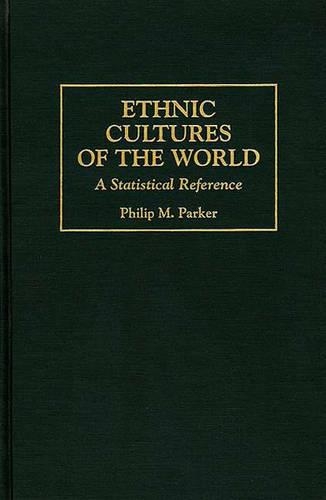
Ethnic Cultures of the World: A Statistical Reference
(Hardback)
Publishing Details
Ethnic Cultures of the World: A Statistical Reference
By (Author) Philip Parker
Bloomsbury Publishing PLC
Greenwood Press
25th February 1997
United States
Classifications
Tertiary Education
Non Fiction
Anthropology
Econometrics and economic statistics
Ethnic studies / Ethnicity
Cultural studies
Reference works
306.021
Physical Properties
Hardback
424
Description
This work is an examination of "borderless" markets where national boundaries are no longer the relevant criteria in making international marketing, economic planning and business decisions. Understanding non-political borders is especially important for products and industries that are "culture bound", and those that require local adaptation. Ethnic culture is one critical factor that affects economic development, demographic behaviour and general business policies around the world. Over 120,000 statistics are provided for over 400 ethnic groups covering a number of social, economic and business variables. A significant review of literature is also included.
Reviews
Although the volumes are valuable as a set, each volume is also complete in itself... The set is very useful as a starting point for economists, social scientists, and those interested in cross-cultural studies. It is recommended for academic libraries.-Choice
You can never be too rich, too fit--or in today's global marketplace, too well-informed. As any harried executive can attest, one company's ignorance is its competitor's edge. Well, better add this to the office library: a new four-volume reference set that uses statistics to recast the world into linguistic, religious, ethnic and national modes...the books make for gripping reading. An ordinary market study may never again suffice....Included in each volume of the encyclopedia is a treatise on Mr. Parker's notion of physio-economics. He asserts that people spend 80% of their incomes to satisfy physiological needs related to climate, topography, and other natural forces. These intrinsic realities--say, living in a rainy climate or on a mountain top--drive not only world consumption patterns but also an inclination to work and earn money....To understand such demand nuances, Mr. Parker argues, is to unlock the secret of today's global marketplace.-The Wall Street Journal Europe
"Although the volumes are valuable as a set, each volume is also complete in itself... The set is very useful as a starting point for economists, social scientists, and those interested in cross-cultural studies. It is recommended for academic libraries."-Choice
"You can never be too rich, too fit--or in today's global marketplace, too well-informed. As any harried executive can attest, one company's ignorance is its competitor's edge. Well, better add this to the office library: a new four-volume reference set that uses statistics to recast the world into linguistic, religious, ethnic and national modes...the books make for gripping reading. An ordinary market study may never again suffice....Included in each volume of the encyclopedia is a treatise on Mr. Parker's notion of physio-economics. He asserts that people spend 80% of their incomes to satisfy physiological needs related to climate, topography, and other natural forces. These intrinsic realities--say, living in a rainy climate or on a mountain top--drive not only world consumption patterns but also an inclination to work and earn money....To understand such demand nuances, Mr. Parker argues, is to unlock the secret of today's global marketplace."-The Wall Street Journal Europe
Author Bio
PHILIP PARKER is an Associate Professor at the European Institute of Business Administration (INSEAD) in Fontainebleau, France, where he teaches graduate courses in multivariate statistics, strategic marketing, and international marketing. He is the author of Climatic Effects on Individual, Social, and Economic Behavior (Greenwood, 1995).
